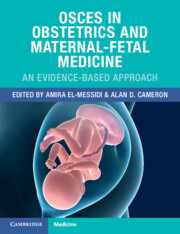Book contents
- OSCEs in Obstetrics and Maternal-Fetal Medicine
- OSCEs in Obstetrics and Maternal-Fetal Medicine
- Copyright page
- Dedication
- Contents
- Preface
- Acknowledgments
- List of Abbreviations
- Contributors
- Section 1 Obstetric Aspects of Antenatal Care
- Section 2 Labor and Delivery
- Chapter 15 Labor at Term
- Chapter 16 Induction of Labor at Term
- Chapter 17 Cesarean Delivery on Maternal Request
- Chapter 18 Vaginal Birth after Cesarean Section
- Chapter 19 Shoulder Dystocia
- Chapter 20 Fetal Malpresentation and Breech Delivery
- Chapter 21 Amniotic Fluid Embolism and Disseminated Intravascular Coagulation
- Chapter 22 Postpartum Hemorrhage
- Section 3 Placental Complications
- Section 4 Neurological Disorders in Pregnancy
- Section 5 Psychiatric Disorders in Pregnancy
- Section 6 Cardiopulmonary Conditions in Pregnancy
- Section 7 Hepato-Renal and Gastrointestinal Conditions in Pregnancy
- Section 8 Connective Tissue Disorders in Pregnancy
- Section 9 Hematologic Conditions in Pregnancy
- Section 10 Endocrine Disorders in Pregnancy
- Section 11 Infectious Conditions in Pregnancy
- Section 12 Malignant Conditions in Pregnancy
- Section 13 Miscellaneous Conditions
- Index
- References
Chapter 18 - Vaginal Birth after Cesarean Section
from Section 2 - Labor and Delivery
Published online by Cambridge University Press: 23 February 2023
- OSCEs in Obstetrics and Maternal-Fetal Medicine
- OSCEs in Obstetrics and Maternal-Fetal Medicine
- Copyright page
- Dedication
- Contents
- Preface
- Acknowledgments
- List of Abbreviations
- Contributors
- Section 1 Obstetric Aspects of Antenatal Care
- Section 2 Labor and Delivery
- Chapter 15 Labor at Term
- Chapter 16 Induction of Labor at Term
- Chapter 17 Cesarean Delivery on Maternal Request
- Chapter 18 Vaginal Birth after Cesarean Section
- Chapter 19 Shoulder Dystocia
- Chapter 20 Fetal Malpresentation and Breech Delivery
- Chapter 21 Amniotic Fluid Embolism and Disseminated Intravascular Coagulation
- Chapter 22 Postpartum Hemorrhage
- Section 3 Placental Complications
- Section 4 Neurological Disorders in Pregnancy
- Section 5 Psychiatric Disorders in Pregnancy
- Section 6 Cardiopulmonary Conditions in Pregnancy
- Section 7 Hepato-Renal and Gastrointestinal Conditions in Pregnancy
- Section 8 Connective Tissue Disorders in Pregnancy
- Section 9 Hematologic Conditions in Pregnancy
- Section 10 Endocrine Disorders in Pregnancy
- Section 11 Infectious Conditions in Pregnancy
- Section 12 Malignant Conditions in Pregnancy
- Section 13 Miscellaneous Conditions
- Index
- References
Summary
You are seeing a 29-year-old G2P1 with a singleton pregnancy at 34+6 weeks’ gestation for a routine prenatal visit. Pregnancy dating was confirmed by first-trimester sonography. She reports normal fetal activity and has no clinical complaints. Your colleague following her obstetric care is now on a two-month leave. Although mode of delivery was addressed early in prenatal care, your colleague left you a note to discuss a trial of vaginal birth after Cesarean delivery (VBAC) with the patient.
Keywords
- Type
- Chapter
- Information
- OSCEs in Obstetrics and Maternal-Fetal MedicineAn Evidence-Based Approach, pp. 252 - 262Publisher: Cambridge University PressPrint publication year: 2023

